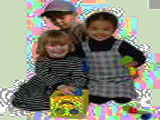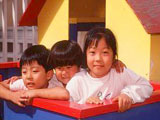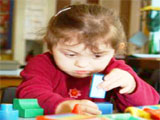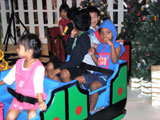Special Needs Programmes
Support Services
St Gerard's offers a series of services to supplement the various programs. The various support services include:
 Parent Training
Parent Training
 School Psychologists
School Psychologists
 Occupational Therapy
Occupational Therapy
 Speech Therapy
Speech Therapy
 Music Therapy
Music Therapy
 Art Therapy
Art Therapy
 Aqua Therapy
Aqua Therapy
 Nutritionist
Nutritionist
Parent Training
Parent training provides the theoretical base as well as practical experience to help parents take on the role
of 'teacher' to their children. Parents are encouraged to assume an active role in helping their children
progress at a much faster rate. The ultimate aim is to empower parents so that they can use the knowledge
and skills acquired with their children independently and confidently. Parents also benefit from the
opportunities to meet other parents, thus enabling them to provide and receive emotional support to and from
one another. St Gerard's encourages parents to attend the various parent training and education programs
offered by the school. The parent trainer is a staff of St Gerard's or a consultant in related field. Training
will be conducted in small groups to enhance the personalized tell, show and guide method of training. Ideally,
both parents should attend to ensure consistency in carry-over of what is learnt with the child. Should domestic
helpers be the main caregiver of the child, whilst the parents are at work, they too are encouraged to attend
the training.
Psychologists
Our psychologists provide support for teachers and parents in the management of challenging behaviours that can
impede a child's learning. Before a behavioural intervention is carried out, the psychologists gather information
from teachers and therapists who are involved directly with the child. An observation is then made of the child
in the classroom. The psychologists may be involved in the intervention directly, but the eventual goal is to
provide inputs to the teachers and parents / caregivers in the management of the child.
Another area of involvement is in the remediation of skills, where a formal or informal assessment is carried
out on the child. The information obtained from the assessment, together with other pertinent information
gathered about the child from the parent or teacher, is then used to evaluate the child's learning potential.
Occupational Therapy
Occupational Therapy is the therapeutic use of self-care, work and play activities to increase a child's
ability to be independent, enhance development and prevent disability; this may include the adaptation of a
task or the environment to achieve maximum independence and to enhance the quality of life. The term occupation,
as used in occupational therapy, refers to the "occupations" or activities that fill daily life. These activities
are the basis for evaluating, specifying and treating problems interfering with functional performance.
Role of Occupational Therapists
Children are seen in occupational therapy to maximize his or her independence in the home, school and community
environments. For the child, this may include self-care activities, playing, going to school, and being part of
a family at home.
Our Occupational Therapists are skilled in assessing a child's functional levels in the areas of fine and gross
motor, visual perception, visual motor, self-care/activities of daily living, feeding and sensory processing. In
addition, Occupational Therapists assess the need for adaptive equipment and technology, and make the
appropriate recommendations.
Occupational Therapy Services in St Gerard's
Fine Motor Manipulation - Children are taught how to use their hands together, hold small items correctly and
use a pencil and scissors in preparation for school readiness and dressing skills. Handwriting program is also
conducted.
Perceptual Skills - Uses puzzles and copying designs to help children develop eye-hand coordination and
other perceptual skills that affect functional mobility and home safety.
Sensory Processing - Assists children in developing the perception & use of touch, movement, sight, sound,
smell, the force of gravity and body position to function in their environment.
Sensory Motor - Teaches children how to use their senses to move their bodies through the environment e.g.
postural control, motor planning etc.
Activities of Daily Living - Emphasis on achieving independence in daily living activities such as
dressing, grooming, brushing, bathing, feeding & toileting
Oral Motor Control - Assists children in learning how to use the muscles of the mouth to suck, swallow
and chew. Learning to use a spoon and drinking from a cup is also emphasized.
Behaviour - Works on children who need some sort of sensory input to focus on tasks in classroom and at
home. Also helps children who are hypoactive and hyperactive to achieve optimal arousal state using sensory
activities to perform better in different settings.
Equipment/Seating - Provides children with the necessary equipment to facilitate development (seats,
splints, adaptive spoons, straps for chairs and other specialized equipment). When needed, the environment is
also modified to suit the children's needs, and to enhance their independence where possible.
Speech Therapy
Speech & Language Therapy (SLT) helps the child realize his or her maximum communicative ability. The Speech
Language Therapist assesses the child's communicative ability and then prioritizes the intervention goals that
best meet the child's needs. Intervention can begin with the child in an individual session, in a group setting
or in consultation with the staff or parents.
Music Therapy
Music Therapy involves the creative use of music in establishing an interaction and a shared musical experience
with the child.
The therapist works on individually set therapeutic goals during the weekly half-hour sessions, during which the
children are seen either individually or in small groups of 2 - 4 children. Goals include increasing eye contact
and on-seat behaviour, and encouraging vocalisation, decision-making, turn-taking skills, and initiation.
Improvisation plays a key role in music therapy, where children are given opportunities to improvise on a wide
variety of percussion instruments.
Art Therapy
Art Therapy is a method of psychotherapy where children can express their feelings when they are in confusing
time. The focus is communicating their emotions through art such as drawing, painting, clay or markers. This
method of therapy is used for all types of children, at all ages. Art Therapy has also proved useful for children
with all types of learning disabilities.
We are looking into the possibility of getting external art therapists to conduct polymer clay and creative arts
lessons at St Gerard's.
Aqua Therapy
St Gerard's is incorporating swimming/aqua therapy with a view to ensuring that a child acquires good swimming
skills as well as growth in confidence and self-esteem. As part of this program, we are looking at the
possibility of incorporating Sensory Hydro play for children with Sensory Integration Difficulties.
Nutritionist
Children today face an increasing number of nutrition problems, including fragmented eating habits, poor food
choices, obesity and eating disorders. St Gerard's is providing a nutritionist who would be able to help our
children with their dietary and feeding issues and at the same time be able to help parents with their queries
and concerns.




